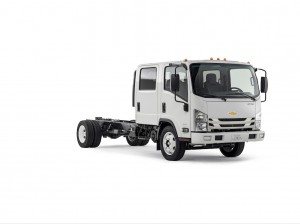In the continuing battle for an edge in global markets, General Motors has quietly staked out a position in East Africa, one of the world’s most promising emerging markets.
GM already holds a leading position in Kenya and recently announced plans to double production at a plant in Nairobi, which is used to re-assemble commercial trucks made by GM and its global partners.
It is the largest manufacturer of commercial vehicles in the East African region and the Nairobi plant assembles a wide range of Isuzu trucks & buses and also retails fully built Chevrolet passenger vehicles and pickup trucks.
GM and Isuzu rekindled their relationship last summer with a new agreement for the companies to jointly produce medium-duty trucks.
Some 20,000 new vehicles were sold in Kenya last year and more than 90% were in the commercial sector where GM holds a dominant position. Three years ago GM was building 10 vehicles per day in Nairobi. It now builds 22 and the figure will double with new investment, GM officials said.
More than 80% of the vehicles sold in Kenya or around 80,000 cars a year are low-priced used vehicles and as it other emerging economies demands is expected to grow.
The Nairobi plant, one of three GM manufacturing hubs in Africa, is geared towards the commercial bus and truck market and typically builds trucks weighing between 3.5 tons and 15 tons. GM also has a presence in Egypt and South Africa. Both the Egyptian and South African operations have faced stresses lately that can be traced back to economic and political upheavals in both countries.
GM is now in the midst of increasing production of one of its most popular vehicles, a 26-seat bus. The biggest customer for the buses is Kenyan government, which hopes to use them relieve Nairobi’s traffic congestion.
(Cadillac Escala Concept reveals new design direction for Detroit brand. Click Here to check it out.)
GM’s managing director Rita Kavashe said despite the high bank loan rates, the company hopes to sell at least 1,400 units by end year.
“In terms of capability and capacity, we are able to advance in the East African region. There is a demand to increase production due to the increase in development initiatives such as the SGR (Standard Gauge Railway) development program among others.” said she said.
GM also signed on last week to become a sponsor of the Kenya Rugby Union. As the KRU’s transport partner, GM will provide buses and their double cabin pickups to transport the national rugby teams during their training activities, local matches and international tournaments to and from the airport.
“Rugby is a rapidly growing sport in Kenya and our partnership with KRU makes perfect sense as we continue to grow together. In addition, our Isuzu range of vehicles offer performance, durability, strength and reliability; qualities that directly resonate with the sport of rugby,” Kavashe noted.
(Click Here to see more about the Roadkill Night at Woodward Dream Cruise.)
The partnership will see the Kenya Rugby Union receive three Isuzu GB Polo buses that will be used by the various rugby teams while traveling to domestic and international competitions among other duties undertaken by the Rugby Team.
“The partnership announced today is a statement of General Motors’ commitment to investing in the sport of rugby. On behalf of the Kenya Rugby Union I would like to express our profound appreciation to the company for choosing to partner with us,” the KRU said in a statement.
GM East Africa Ltd was founded in 1975 as a joint venture between the Government of Kenya and General Motors Corp.
The current shareholders are: GM Asia Pacific Holdings 57.7%, which is the controlling shareholder and Kenya’s Industrial and Commercial Development Corp., which owns 20% of the company. The other investors include Centum Investments and Itochu Corp.
(Trucks capture the hearts, wallets of working and wealthy men alike. Click Here for the story.)
GM East Africa has more than 30 years of experience in local assembly and service. Vehicles are engineered to suit local operating conditions with up to 50% local content on some models. GM East Africa continues to design, build and sell the world’s best vehicles. It enjoys an expansive distribution footprint across Kenya and the East African region to cater for all sales and after sales requirements.

